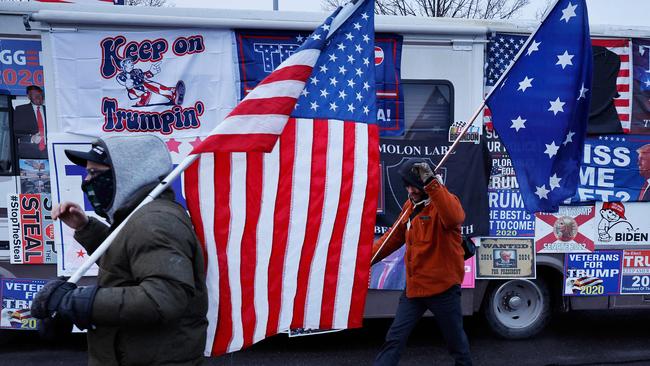Does the US offer a lesson in patriotism and a model for change on Australia Day?
American patriotism is markedly more overt than in Australia. We could learn from the nation’s approach to Juneteenth.

Perhaps Australian patriotism is more covert, but I doubt it. The tired self-loathing debate about Australia Day, year after year, has worn down pride in Australia’s transformation from penal colony to among the richest and most cohesive nations in the world, especially among younger generations who focus obsessively on the dark chapters in our history – which blight all nations, albeit ours far less than most.
America’s national day, July 4, also ushered in regrettable acts, slavery and dispossession of the Native Americans, but in the US no one seriously suggests changing the date.
Americans proudly unite around their national day in a way Australians do not. It’s hard to imagine big US companies deriding Independence Day by withdrawing celebratory paraphernalia for sale, or offering staff the option of an alternative day to celebrate, as Australian companies have shamefully done.
The US has recently offered a simple solution to the understandable angst some feel about national days, African-Americans in the US, and Aborigines and Torres Strait Islanders in Australia for instance. Why not introduce another public holiday as Americans have done – Juneteenth, June 19, which is now a federal public holiday commemorating the end of slavery in the US.
Joe Biden, to his credit, established the day as a holiday in June 2021, to remember the appalling treatment of black Americans and their achievements under the shadow of adversity. It marks the day in 1865 when Union general Gordon Granger arrived in Galveston, Texas and told enslaved African-Americans of their freedom and the end of the Civil War.
“By making Juneteenth a federal holiday, all Americans can feel the power of this day, and learn from our history, and celebrate progress, and grapple with the distance we’ve come but the distance we have to travel,” the President said in a speech at the time.
Why doesn’t Australia establish another public holiday to celebrate our Indigenous people? Exactly the same arguments apply. It’s such an obvious solution it’s astonishing it hasn’t already been enacted. A special national day to mark their ill-treatment, before and after Federation, and celebration of their subsequent achievements would undermine the argument Australia Day should be lamented as Invasion Day. Schools could schedule events and curriculums around it.
The government should establish a panel of historians to work out what the best date might be – perhaps May 27, 1967, when Australians overwhelmingly voted to include Aborigines in the census.
Establishment of such a day soon would go some way to address the hurt some Aboriginal people feel in the wake of the unnecessary and divisive voice poll.
Public holidays are popular, and the impact of an additional one on economic activity negligible. If Australia ever became a republic, that date could replace January 26 as our national day. But until then, it’s the best, least divisive, date we have to celebrate what was, undeniably, the start of a modern civilisation on our great continent.
Making the date of federation the holiday on January 1 doesn’t work because it’s already a public holiday, not to mention obtaining permission from the British to have limited self-government lacks all the colour and daring of the First Fleet. In a world beset by ever rising tensions, patriotism is increasingly an important asset for any nation, ensuring a greater share of citizens would make sacrifices for the common good if so required. It’s in governments’ interest to foster pride in one’s nation; otherwise what is the point in being separate? Australia’s annual bout of self-loathing around Australia Day isn’t only embarrassing, it’s damaging to our prospects, economic and political.




Driving around New Hampshire this week I was struck by how often American flags fluttered outside houses and businesses, and adorned the walls of pubs and restaurants in the scattered towns that dot the tiny “granite” state, something rarely seen back home.